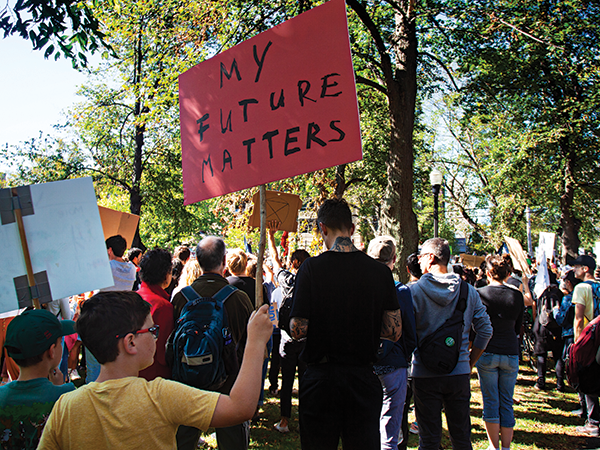
On September 27, the last Friday of the month, 10,000 Haligonians marched through the streets of Halifax calling on politicians to act on climate change. Walking down Spring Garden road there were Haligonians of all ages, from babies to grandparents, channelling their inner Greta and asking for their government to act. The air was electric with our combined energy and gave a sense of hope that maybe we can fix this.
Since the climate strike, many have been wondering what to do with that energy we demonstrated as a city at the climate march. Answers often gravitate to the most tangible options, like reducing one's use of single-use plastics or eating less meat. But perhaps the most powerful tool for change we have is democracy.
On October 21, Canadians will elect the members of parliament and prime minister who will have the tremendously difficult task of championing Canada's transition to a sustainable economy.
According to the UN, we have roughly 10 years to change the way we live if we hope to keep warming below 1.5 degrees Celsius. As elections happen only once every four years, time is fleeting and this election is critical.
The good news is that all four parties running in the Halifax riding believe that climate change is real, that climate change is caused by humans and that we must reduce Canada's carbon emissions. But this consensus can also lead to confusion for voters. If every party believes we need to address climate change, then maybe we'll vote based on other issues that are important to us and rest assured that any elected government will ensure we do not surpass 1.5 degrees of warming? Unfortunately, this is not the case.
Of the four climate change plans, the odd one out is most certainly the Conservative Party. In contrast to what Conservative leader Andrew Scheer has stated, scientists have found that under the Conservative climate plan carbon emissions would continue to rise. In defence of his party's plan, Conservative candidate for Halifax Bruce Holland says it's "based on three guiding principles: Green technology, not taxes (as the Liberal Party is proposing), cleaner and greener natural environment; and, taking the climate change fight global."
Under the Liberal, NDP and Green Party plans carbon emissions would lower, with the Green Party plan the most ambitious and most likely to limit warming to 1.5 degrees. All three of these parties, unlike the conservative party, support legislating climate targets, a carbon tax and banning single-use plastics. Liberal candidate for Halifax Andy Fillmore says his plan includes measures like "implementing a national carbon price, phasing out coal, making historic investments in public transit, supporting clean technology, doubling the amount of protected nature in Canada, making 1.5 million homes more energy efficient, and planting 2 billion trees to support healthy ecosystems that help fight climate change."
Pushing one step further, the NDP and the Green Party have promised to stop subsidizing the fossil fuel industry, with NDP candidate Christine Saulnier saying their plan focuses on job creation and saving families money while taking on big polluters with UNDRIP [United Nations Declaration on the Rights of Indigenous People] "at the heart of our work and support working people through a just transition to a clean energy future."
And the Green Party is the only party against the construction of future pipelines in Canada. Candidate for Halifax Jo-Ann Roberts says their plan stacks up against the NDP as stronger on carbon targets: "We want to reduce total CO2 emissions by 60 percent below 2005 levels by 2030." And their party has a plan to ban fracking.
Isabelle Hurley is a Masters student at Dalhousie University in the Future of Marine Ecosystems Lab.
